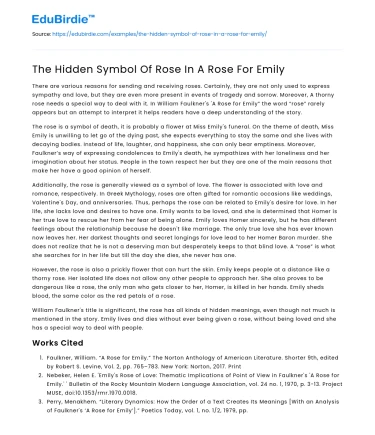There are various reasons for sending and receiving roses. Certainly, they are not only used to express sympathy and love, but they are even more present in events of tragedy and sorrow. Moreover, A thorny rose needs a special way to deal with it. In William Faulkner's 'A Rose for Emily” the word “rose” rarely appears but an attempt to interpret it helps readers have a deep understanding of the story.
The rose is a symbol of death, it is probably a flower at Miss Emily's funeral. On the theme of death, Miss Emily is unwilling to let go of the dying past, she expects everything to stay the same and she lives with decaying bodies. Instead of life, laughter, and happiness, she can only bear emptiness. Moreover, Faulkner’s way of expressing condolences to Emily's death, he sympathizes with her loneliness and her imagination about her status. People in the town respect her but they are one of the main reasons that make her have a good opinion of herself.
Save your time!
We can take care of your essay
- Proper editing and formatting
- Free revision, title page, and bibliography
- Flexible prices and money-back guarantee
Additionally, the rose is generally viewed as a symbol of love. The flower is associated with love and romance, respectively. In Greek Mythology, roses are often gifted for romantic occasions like weddings, Valentine's Day, and anniversaries. Thus, perhaps the rose can be related to Emily's desire for love. In her life, she lacks love and desires to have one. Emily wants to be loved, and she is determined that Homer is her true love to rescue her from her fear of being alone. Emily loves Homer sincerely, but he has different feelings about the relationship because he doesn't like marriage. The only true love she has ever known now leaves her. Her darkest thoughts and secret longings for love lead to her Homer Baron murder. She does not realize that he is not a deserving man but desperately keeps to that blind love. A “rose” is what she searches for in her life but till the day she dies, she never has one.
However, the rose is also a prickly flower that can hurt the skin. Emily keeps people at a distance like a thorny rose. Her isolated life does not allow any other people to approach her. She also proves to be dangerous like a rose, the only man who gets closer to her, Homer, is killed in her hands. Emily sheds blood, the same color as the red petals of a rose.
William Faulkner's title is significant, the rose has all kinds of hidden meanings, even though not much is mentioned in the story. Emily lives and dies without ever being given a rose, without being loved and she has a special way to deal with people.
Works Cited
- Faulkner, William. “A Rose for Emily.” The Norton Anthology of American Literature. Shorter 9th, edited by Robert S. Levine, Vol. 2, pp. 765–783. New York: Norton, 2017. Print
- Nebeker, Helen E. 'Emily's Rose of Love: Thematic Implications of Point of View in Faulkner's 'A Rose for Emily.' ' Bulletin of the Rocky Mountain Modern Language Association, vol. 24 no. 1, 1970, p. 3-13. Project MUSE, doi:10.1353/rmr.1970.0018.
- Perry, Menakhem. “Literary Dynamics: How the Order of a Text Creates Its Meanings [With an Analysis of Faulkner's ‘A Rose for Emily’].” Poetics Today, vol. 1, no. 1/2, 1979, pp. 35–361. JSTOR, www.jstor.org/stable/1772040.
- Skinner, John L. “‘A Rose for Emily’: Against Interpretation.” The Journal of Narrative Technique, vol. 15, no. 1, 1985, pp. 42–51. JSTOR, www.jstor.org/stable/30225110.
- Watkins, Floyd C. “The Structure of ‘A Rose for Emily.’” Modern Language Notes, vol. 69, no. 7, 1954, pp. 508–510. JSTOR, www.jstor.org/stable/3039622






 Stuck on your essay?
Stuck on your essay?

